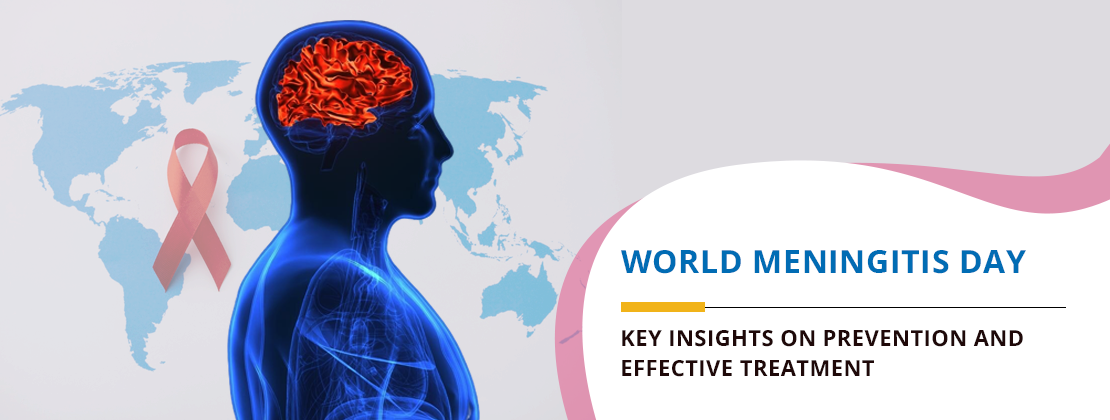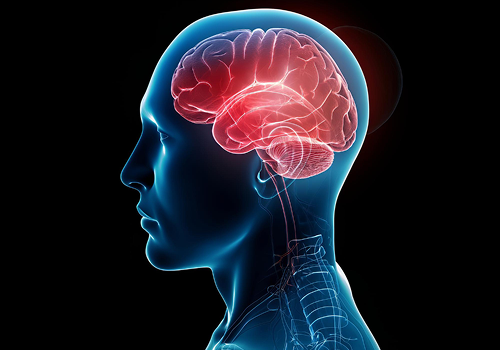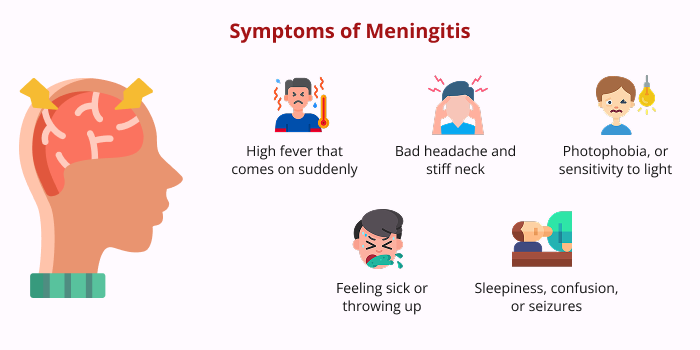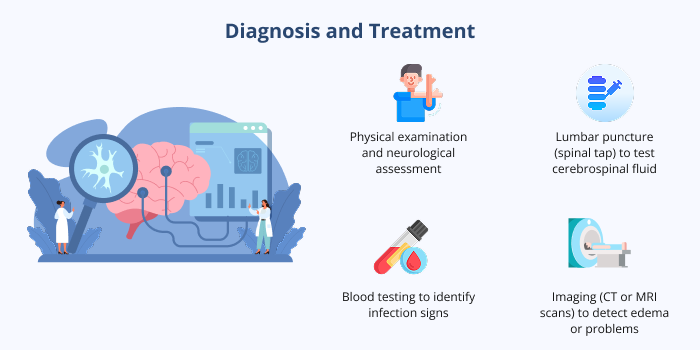
Home / Blog / World Meningitis Day: Key Insights on Prevention and Effective Treatment
October 28, 2025
World Meningitis Day is a reminder every year that meningitis is still one of the critical health concerns across the world, causing high rates of mortality and morbidity.
Knowing what causes meningitis, how to spot the symptoms, and how to get treatment quickly can save lives. In addition to this, it is important to prioritise your overall neurological health to reduce the risk of various brain and spinal cord disorders.
HCG Hospitals is a leading multispeciality hospital in Bhavnagar, which has a well-established neurology and neurosurgery department with specialists who have specialised training in managing all major neurological problems, including meningitis.

World Meningitis Day is a designated day dedicated to raising awareness about the key aspects of meningitis, including its prevalence, symptoms, diagnosis, treatment, and prevention.
World Meningitis Day is observed on October 5th every year. On this day, healthcare organisations and health advocacy organisations, doctors, researchers, survivors, and healthcare enthusiasts across the world take part in a unique movement, which encourages prioritising early detection, seeking timely interventions, and adopting effective prevention measures against meningitis.
Patient advocates and global health organisations observed the first World Meningitis Day in 2009 to raise awareness of the impact of meningitis on families and communities.
Over the years, it has grown into a significant effort funded by health organisations around the world that aims to get rid of epidemic meningitis through coordinated vaccination and awareness programmes.
The theme for World Meningitis Day 2025 is “Light the Road Ahead.”
This theme is in line with the WHO’s aim to “Defeat Meningitis by 2030” and remember those whose lives have been touched by this condition.
This year, World Meningitis Day is all about encouraging prevention and early diagnosis and asking for fair access to immunisations and care. This year’s theme is all about bringing the world together. It reminds people that meningitis may impact anybody, anywhere, and that prevention saves lives.
Meningitis is still one of the most common causes of mortality and disability, especially in kids and young people. It can cause serious problems like hearing loss, convulsions, and problems with thinking.
The disease burden is significantly higher in low- and middle-income nations because diagnosis is delayed and there is limited access to proper healthcare services.
The WHO aims to cut the number of meningitis infections in half and the number of deaths by 70% by 2030.
Germ infections are the primary cause of meningitis. However, it can be caused by other factors, too. The following are different meningitis causes:
Bacterial Infections: Bacterial infections, including Neisseria meningitidis, Streptococcus pneumoniae, and Haemophilus influenzae type b (Hib), are typically quite serious and need to be treated immediately with antibiotics and other medical interventions.
Viral Infections: Viral infections, which happen more often and are usually not as bad.
Fungal and Parasitic Infections: Fungal or parasite infections, which happen mostly to those whose immune systems are weak.
Non-infectious Factors: Factors like autoimmune illnesses, certain drugs, or malignancies are also found to cause meningitis.

It’s very important to spot the signs of meningitis early because the disease can get worse very quickly and even lead to death. Here are the commonly observed meningitis symptoms:
Common symptoms seen in infants include irritability, poor eating, and a protruding soft spot (fontanelle).
As meningitis progresses quickly, patients should receive immediate medical attention.

To lower the risk of complications, it is important to find the problem early and treat it quickly. In hospitals, clinicians recommend the following tests for meningitis diagnosis:
Upon receiving a conclusive diagnosis, doctors will recommend different treatment approaches, depending on the type of infection and its severity.
For bacterial meningitis management, doctors recommend immediate hospitalisation and intravenous antibiotics, often coupled with corticosteroids to decrease inflammation.
Viral meningitis is usually self-limiting, and it is managed with rest, water, and pain medication unless complications emerge.
Fungal meningitis is treated with specialised antifungal drugs under constant medical supervision.
In the case of complications, doctors may recommend supportive care, which includes oxygen therapy, hydration, constant monitoring at an intensive care unit (ICU), etc.
Meningitis is best managed with comprehensive care. At HCG Hospitals in Bhavnagar, we offer individualised care for meningitis while also prioritising the comfort, quality of life, and overall well-being of our patients.
Recovery from meningitis can be a long process. Some people may have long-term complications such as trouble with memory, balance, or hearing.
Rehabilitation care for meningitis may include physiotherapy, audiology, and counselling, which aid patients in returning to their normal lives.
The families and caregivers of patients should also learn how to deal with difficulties after meningitis and how to help someone recover emotionally.
If you or someone close to you has any of the following, call for emergency medical help:
Getting medical help early increases the chances of survival and lowers the risk of long-term damage.
Treatment must start right away since meningitis gets worse quickly. The general hospital schedule is as follows:
0–2 hours: Initial investigations and emergency evaluation
Within four hours: a spinal tap and blood tests
With six hours: Start of intravenous antibiotics (if bacterial meningitis is suspected) within 6 hours
Timely interventions are crucial for effective meningitis management.
HCG Hospitals, a leading multispecialty hospital in Bhavnagar, provides team-based care that is necessary for treating meningitis.
Neurologists, infectious disease specialists, critical care doctors, ENT and audiology experts, and physiotherapists all work together to make sure that every patient receives holistic treatment and has a swift recovery.
As a superspeciality hospital, HCG offers the continuity of treatment needed for full recovery, from early diagnosis to rehabilitation.
On World Meningitis Day 2025, all of us should remember that meningitis can be treated and managed effectively if detected early.
Learning about different meningitis symptoms, opting for vaccinations, and getting timely medical help are considered the best measures against meningitis.
Anyone who shows early signs of illness should visit a multispecialty hospital for prompt care and support.
The best ways to reduce your meningitis risk are to get vaccinated against common bacterial strains, practise good hygiene, and seek timely interventions for meningitis-like symptoms.
The main goal of observing World Meningitis Day is to raise awareness about the causes and symptoms of meningitis, as well as ways to prevent it, with the aim of eliminating the disease by 2030.
Opting for vaccination against meningitis and going to the doctor right away if you have symptoms of the disease are considered the best ways to prevent meningitis.
Yes, both children and adults can get meningitis; however, it is more common among children.
Bacterial meningitis can be deadly in a matter of hours; thus, it is crucial to get treatment right away.
Yes. Most cases of bacterial meningitis can be prevented with the meningococcal, pneumococcal, and Hib vaccines.
The efficacy of meningitis vaccines ranges from 80 to 100%.
Yes, especially bacterial and viral varieties, which can spread through droplets in the air or intimate contact.
Meningitis spreads quickly and can be deadly, but with quick action, it is possible to treat it successfully, and patients often see full recovery.